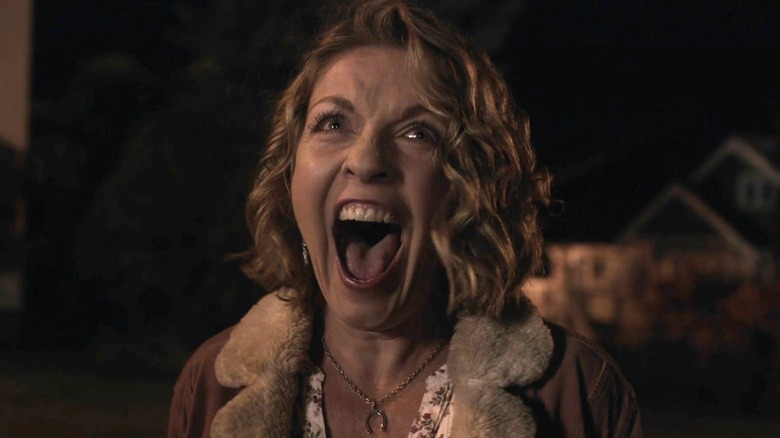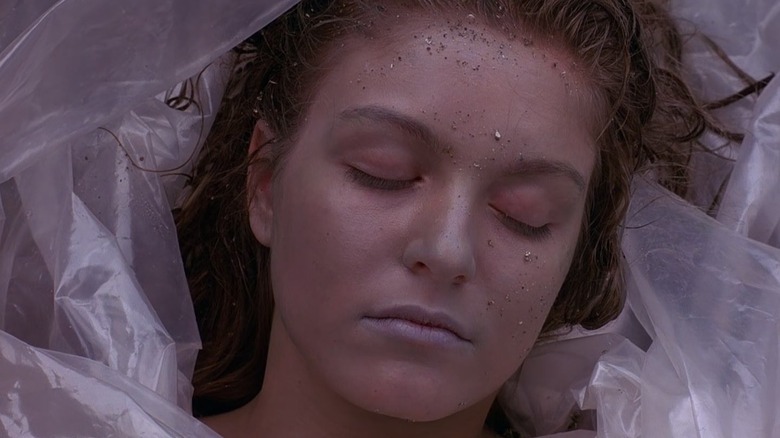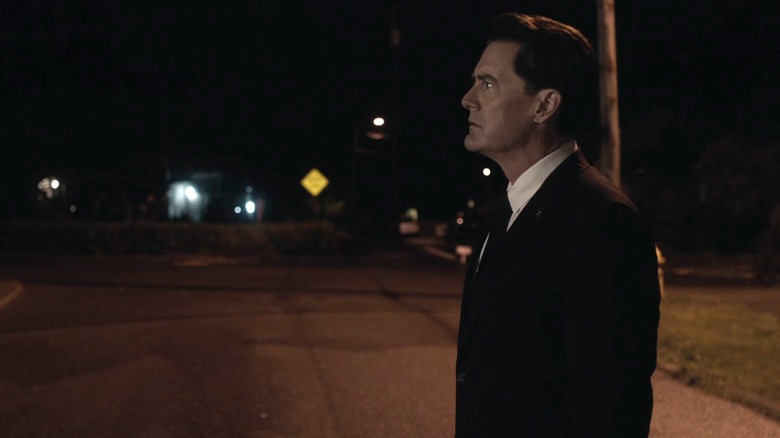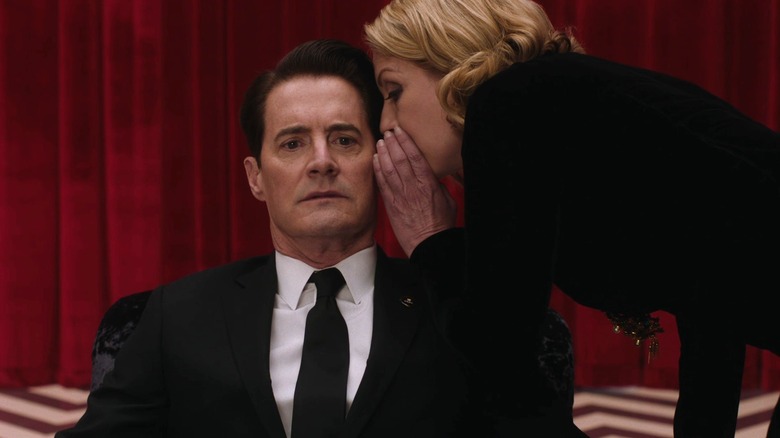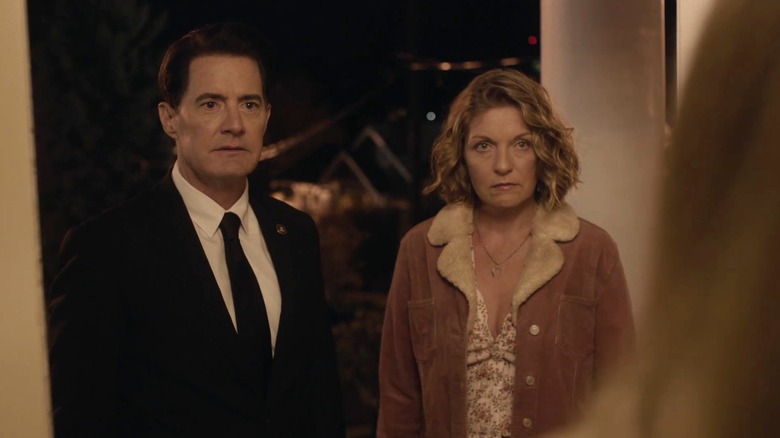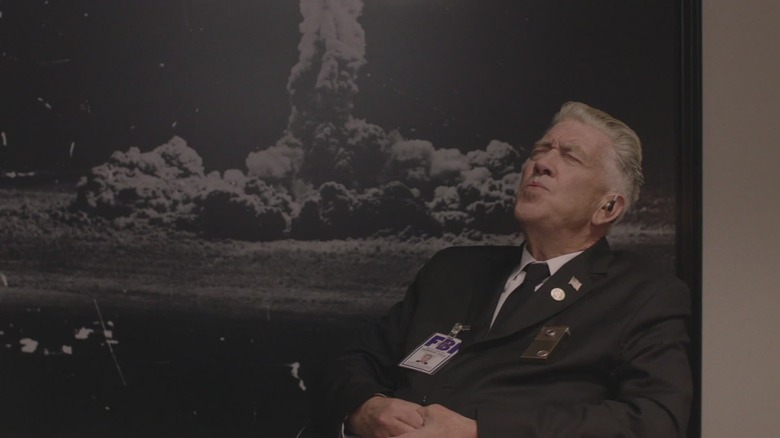Twin Peaks Ending Explained: What Year Is This?
We may receive a commission on purchases made from links.
In many respects, even attempting to write this piece is foolhardy. Articles like this are usually the space to explore an ending that alters a franchise's trajectory, a climactic twist, or something ambiguous that makes you choose what you believed happened. These can all be explained through logic and rationality, and often times, the creators of these works themselves will do interviews about how they see their endings. Storytelling in a visual medium — especially with mainstream Hollywood storytelling — tends to be rather blunt in its desire to impart some sort of message or arrive at a conclusion that satisfies the dramatic and emotional elements of the story.
But we are talking about David Lynch here, the preeminent American cinematic surrealist of the last half century. The word "Lynchian" has become synonymous with something being odd and unexplainable in any movie. This is a man who said the surrealist nightmare "Eraserhead" was his most spiritual film but refused to elaborate on how or why that is the case. Surrealism deals directly with the unconscious mind, and by its nature, the unconscious mind cannot be rationalized. It is literally un-conscious.
So, to say that I'll be "explaining" the ending of one of Lynch's masterpieces, "Twin Peaks," is somewhat of a misnomer. After all, this is not a puzzle to solve. Famously, Lynch never even wanted to answer the central question of the series of who killed Laura Palmer and was only forced to by network executives. There is a structure and story to "Twin Peaks," but that doesn't mean that's the primary focus. What I will be doing is examining the emotional and psychological fallout of the series through the prism of story, as that is truly what the series builds to, as the question "What does it all mean?" won't get you very far.
What you need to remember about the plot of Twin Peaks
A lot transpires over the 48 episodes of television and one feature film that make up the world of "Twin Peaks." However, at its core, there are two primary characters. First, you have coffee-loving FBI Agent Dale Cooper (Kyle MacLachlan). He has been brought to the titular small Washington town to investigate the death of a local high school student named Laura Palmer (Sheryl Lee), who has washed up onshore encased in a plastic tarp. Cooper begins to have dreams of a one-armed man named Mike who claims that an evil entity named Bob is responsible, and he starts his journey through interdimensional spaces like the White and Black Lodges and has several dopplegängers (one of which is possessed by Bob).
The other major character is Laura Palmer herself. Despite being dead in the series' opening minutes, we come to learn so much about her past — specifically, her history of abuse at the hands of her own father (Ray Wise), who has been possessed by Bob. In the afterlife, she also encounters Agent Cooper in the Black Lodge, where she says they will meet again in 25 years. Laura also has her own evil dopplegänger. In the penultimate episode of the show, Cooper goes back in time and prevents the murder of Laura Palmer, thus erasing the events of the timeline of the show.
Yes, there is Audrey Horne, the Log Lady, Dr. Jacoby, and, of course, Michael Cera's Wally Brando, along with dozens of other memorable David Lynch characters and plot lines, but for the ending of the show, Cooper and Laura are the heart of this series.
What happened at the end of Twin Peaks?
After crossing over into another dimension through an electrical field with Diane (Laura Dern), the woman to whom Cooper has been recording messages about his investigation throughout the series, the two have sex and seemingly assume the identities of people named Richard and Linda. Now in Texas and Diane/Linda having left him, Cooper learns of a waitress named Carrie Page that looks exactly like Laura Palmer (and is played by Sheryl Lee). Once they meet, she agrees to go back with him to Twin Peaks, and they visit Laura's old house. However, it is not Laura's mother who lives in the house but a woman we have never seen before (who is, in a fun cameo, the woman who actually owns that house in real life).
As the two walk away from the house, Cooper asks Carrie what year it is in matter that is equal parts perplexed and frightened, which prompts her to hear the sounds of Laura's mother yelling up to the not-there Laura that we heard in the pilot episode before she learns about her daughter's death later that morning. Carrie lets out a guttural scream, the lights go out, and we linger on a black screen for awhile until we see the faint image of Laura whispering in Cooper's ear as the credits roll, calling back to a scene at the beginning of the episode in the Red Room.
What the end of Twin Peaks means
The finale of "Twin Peaks" must work in juxtaposition to the penultimate episode of the series. In that episode, Cooper saves Laura from being murdered, giving you a plot resolution that many would probably find satisfying. But what this finale shows us is that despite saving Laura Palmer in this one timeline, you can't eradicate the cyclical and ever present nature of evil from the world. No matter what dimension Cooper and Laura find themselves in, someone will always be victimized and someone will always need to be the one seeking justice, although the darkness that lurks inside that justice seeker can never be fully squashed. Cooper and Laura are destined to play these roles no matter what dimension they are in, whether their names are Cooper and Laura or Richard and Carrie.
"Twin Peaks" has always been interested in the nature of evil and where it comes from. The highly acclaimed eighth episode of "Twin Peaks: The Return" — arguably the most arthouse episode of television ever produced in Hollywood — posits that it was truly birthed with the invention of the atomic bomb, and once that evil toothpaste is out of the tube, you can't put it back in. You can try all you wish but it's out there now and will be forever. By having these characters traverse dimensions, it just further cements how far that evil has spread.
Another possible explanation of Twin Peaks
By saving Laura before her murder and bringing her to the White Lodge for safety, Cooper has effectively removed Laura from her own timeline. She wasn't murdered, but she is now missing. Bob was unable to fulfill his end of committing the ultimate evil upon Laura, which is taking her life. That disruption probably sends shockwaves throughout all the parallel dimensions, and what we see in the show's final moments in those realities is them somewhat collapsing in on themselves. Laura may be able to hide out in this new dimension, but that evil is coming for her, whether the person she is in this reality knows that she is Laura Palmer or not.
These are just two possible explanations of what the ending of "Twin Peaks" could mean out of thousands. It doesn't even touch what could be happening with Laura's possessed-by-Bob father back in the original timeline after Laura goes missing, where Diane goes after leaving Cooper, or whether Audrey Horne (Sherilynn Fenn) ever encounters and is assaulted by possessed Agent Cooper. The show features so many plot lines that get abandoned or are just not resolved, and this ending doesn't even hint at those resolutions. And it doesn't have to. "Twin Peaks" is a show built on tone and primal, unconscious emotions, and that is what the ending delivers on. Sheryl Lee letting out that scream cuts you to you core, and frankly, that's all I need from the finale. To expect a detailed explanation of the metaphors being used or the science and logic of the multiple dimensions will only frustrate the viewer. Go along for the ride and feel the show.
What did David Lynch say about the ending of Twin Peaks?
As expected from David Lynch, he spoke very little about what he thought the ending of "Twin Peaks" means. Talking with Entertainment Weekly after the series' end in 2017, Lynch constantly answered questions about the show in either incredibly vague terms or just avoids answering altogether. For instance, the interviewer asked about how Cooper always ends each season in a precarious situation, and his response was, "Some things came to a conclusion. And some things dangled out there. And that's sort of the way it is in life." When asked whether Cooper had transformed into Richard in the finale, he said, "You should look at that part again, and you could see it in different ways. I'm not gonna talk about it, though."
If Lynch was the kind of filmmaker who wanted to explain things, he would've been that kind of filmmaker, but that wasn't what interested him. He wanted you to experience what he made and then draw your own conclusions from it. In that interview, Lynch did dangle out there that there could be more "Twin Peaks" in the future, as this is the kind of story that he could pick up at any time (after all, 25 years passed between "Twin Peaks: Fire Walk with Me" and the most recent season), but when asked about where the story could go in the future, all he can say is, "No, I can't talk about that." Sadly, with Lynch's passing in January 2025, it's almost certain we'll never return to this tale.
What we are left with is a purposefully obtuse finale that wrecks me emotionally even if I don't fully understand what's going on. Even though we'll likely never get clarification in the future, it doesn't matter. It's a perfect ending.
